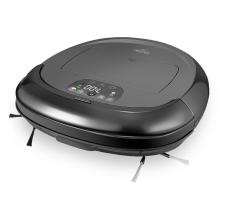Earlier this year, Rethink Robotic’s multi-purpose humanoid Robot ‘Baxter’ took the manufacturing sector by storm with its ability to perform human tasks in factories for fractions of the amount of money it costs to employ human beings. Baxter costs about $22,000 to buy and essentially just a few dollars an hour over the span of its use. And now Boston-based Rethink Robotics is pointing to new areas for Baxter to be commercialized from mixing up lattes at your favorite coffee bar to helping the elderly.
Scott Eckert, CEO of the Boston-based company recently told the Boston Business Journal that since its launch, Baxter has had a strong appeal among manufacturing companies from across the board of small and medium size businesses.
“Particularly plastic manufacturers. We've also had a fair amount of interest and sales into large companies — big automotive companies, consumer products companies,” said Eckert.
The humanoid robot is equipped with two arms powered by a revolutionary new Software Development Kit (SDK) that will allow researchers to create a wide array of custom applications for robots. The Baxter Research Robot runs on ROS, the global Robot Operating System standard, which gives researchers the ability to share innovations and build on each other’s work and know-how.
Image via robots.net
Baxter has been described by Eckert as the robot with ‘common sense’ with its built-in intelligence, it knows about the part it is working on. Back in January, just as shipments of Baxter began, Eckert lauded the robot as a ‘productivity tool’ to all businesses including the small ones.
"We focus on what we call the 'Three Ds': The dirty, dull and dangerous jobs in a manufacturing environment. People can do much more highly skilled activity," Eckert told Benzinga.com in January. Eckert went on to say that Baxter would not be replacing human workers. “So, think of it this way: A person can produce so many widgets per hour. A person plus a Baxter can do one-and-a-half to two times as many of those widgets per hour, and that's the way our customers are thinking about it," said Eckert. Baxter and its robotic counterparts are significantly cheaper to build, and subsequently buy, thanks to a drop in the cost of cameras and sensors such as sonar, and major advances in computing power and software, especially in the area of learning algorithms know as artificial intelligence.
Now, Rethink Robotics is looking at new sectors where Baxter can be of use – such as the service sector, with its potential to assist to people in their homes. Eckert points to the aging of the baby boomer population in the coming years. “There is going to be a big market opportunity for a bunch of different players in the robotics space, us and others,” Eckert told Boston Business Journal. “In a similar vein, I think there are other service opportunities — robots providing services to people, maybe not in their homes, but in other forms. A robot could be a ticket taker, or a toll taker, or could be a barista. There are a bunch of different service offerings where robots might make sense. They all hinge on the ability to have a robot that is inexpensive, and safe being around people.”





